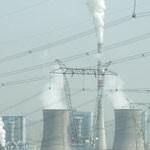Science & Technology
Science & Technology
Coal Fuels China’s Economic Growth, Enables Americans’ Enjoyment Thereof
David Biederman June 28, 2014
Coal is fueling the giant producer of Asia and enabling many of China’s 1.3 billion people to overcome crushing poverty. Goods marked “made in China” might as well be marked, “Made possible by coal.” Americans who use and enjoy products made in China—that is, all Americans—should celebrate this life-serving fossil fuel, as it makes such goods possible.
Science & Technology
New “Neurobridge” Technology Enables Quadriplegic to Move Hand
Aaron Fried June 27, 2014
Physicians and researchers affiliated with the Ohio State Wexner Medical Center and with the Battelle research center have pioneered the “Neurobridge,” a device that transmits signals from a chip implanted in the user’s brain to an electrical sleeve on his arm that in turn activates his muscles.
Science & Technology
BP Drone Makes Oil Production Safer and More Profitable
David Biederman June 17, 2014
BP launched a thirteen pound drone earlier this month in Prudhoe Bay, Alaska. BP turned to a drone (i.e., an unmanned aerial vehicle)—specifically, the Puma AE from AeroVironment—to improve monitoring of operations in the enormous and hazardous arctic environment of northern Alaska.
Science & Technology
Environmentalists Succeed in Sabotaging Prosperity
David Biederman June 11, 2014
Why is TransCanada “exploring how to modify existing contracts with Keystone XL customers to allow for rail shipments” of oil (as Bloomberg reports)? The answer is that the U.S. government—spurred by environmentalist groups—has prohibited completion of the pipeline. “This is a market inefficiency created by regulatory impediments,” explains TransCanada CEO Russ Girling.
Science & Technology
Ohio Anti-Fracking Group Attacks Individual Rights, Promises to Continue
David Biederman June 9, 2014
Legislation that grants “rights” to entities such as “natural communities” (whatever that means), “wetlands, streams, rivers,” or the like, necessarily violates the genuine rights of individual human beings—the only entities that possess or can possess rights. With such a legal framework in place, the majority of voters could violate the rights of individuals virtually whenever they want.
Science & Technology
UK’s Regressive Energy Policies
David Biederman June 5, 2014
The U.S. Energy Information Administration (EIA) recently documented the United Kingdom's skyrocketing consumption of wood for electricity generation and space heating—a consequence of the country’s regressive “environmental” policies. Among other things, these policies require electricity providers to use a set proportion of more costly fuels such as wood, now trendily called “biofuel.”
Science & Technology
Microsoft’s Universal Translator: Fruit of Massive Profits
Ari Armstrong June 4, 2014
“Imagine being able to speak in German, and have your message conveyed grammatically and semantically correct in English. That future is here,” Microsoft touts in a recent video. Microsoft is developing the translator for use with Skype, the web communication platform Microsoft purchased a few years ago.
Science & Technology
American Spirit Alive and Well in North Dakota
David Biederman June 3, 2014
A recent article by the Associated Press, “Oil Boom Bringing More than Construction,” describes the revitalization of Watford City, North Dakota—revitalization made possible not only in that town but in many others as well, by the fracking revolution. “Luke Allen, who moved here last summer to start his dental practice, finds the pioneer spirit exhilarating,” the AP reports.
Science & Technology
Russia’s Useful Environmentalists
David Biederman May 31, 2014
“Russia's No. 2 oil producer, Lukoil, and France's Total agreed . . . to set up a joint venture to tap vast tight [shale] oil reserves in Siberia” Reuters reports. The move provides further evidence that the Russian government’s criticism of fracking in Europe is intended to maintain Russia’s position as a key supplier of European energy.
Science & Technology
At World Cup Opening Ceremony, a Paraplegic Will Walk—Thanks to Miguel Nicolelis and Co
Derrick Nantz May 27, 2014
During the opening ceremonies for the World Cup June 12, a young paraplegic will walk onto the field in front of 65,000 fans and kick the first ball of the event. How? By means of a bionic exoskeleton, which he will control with his mind.
















